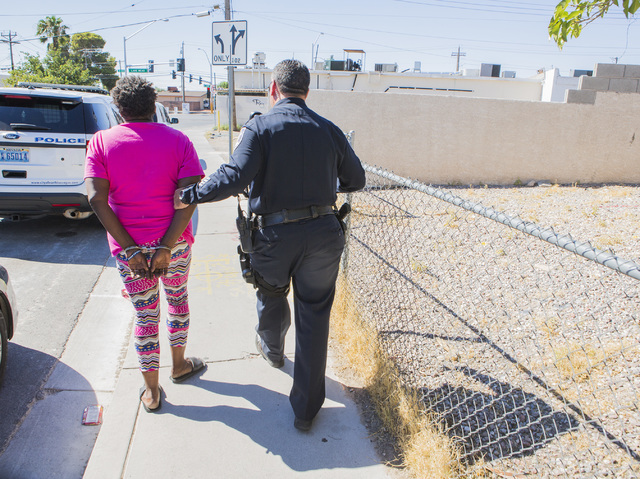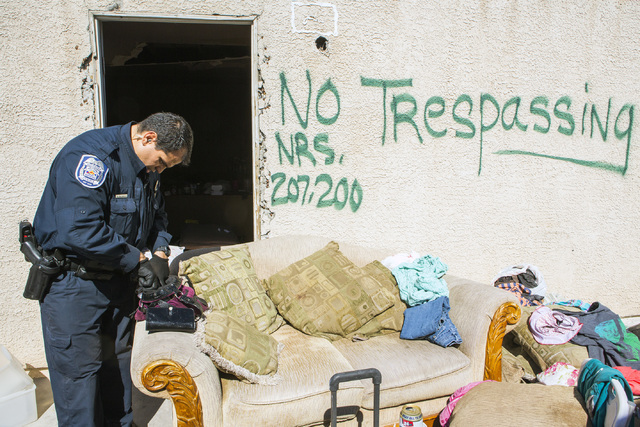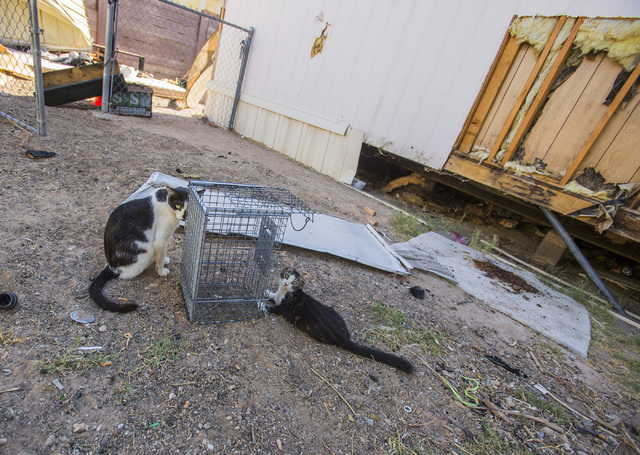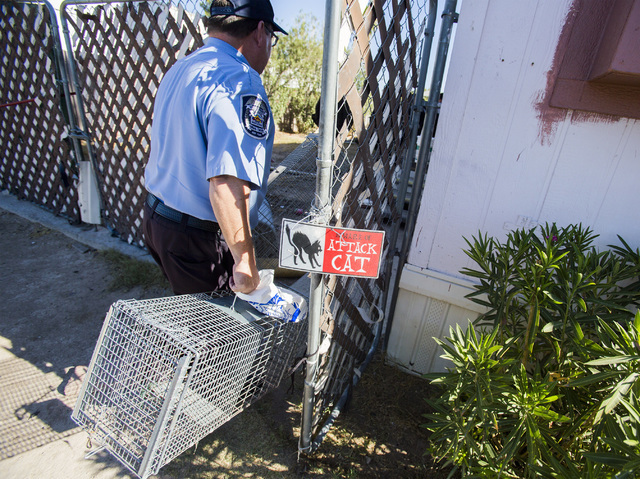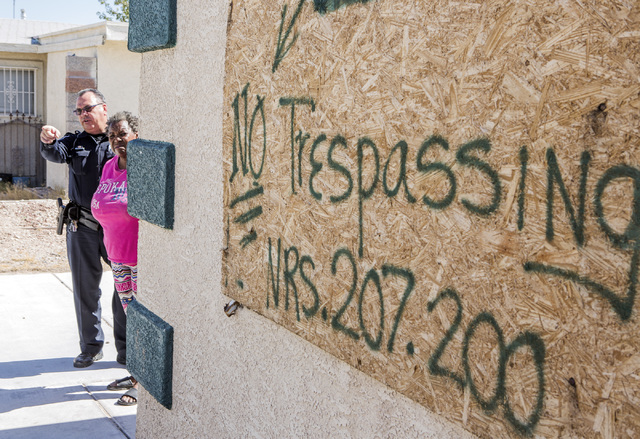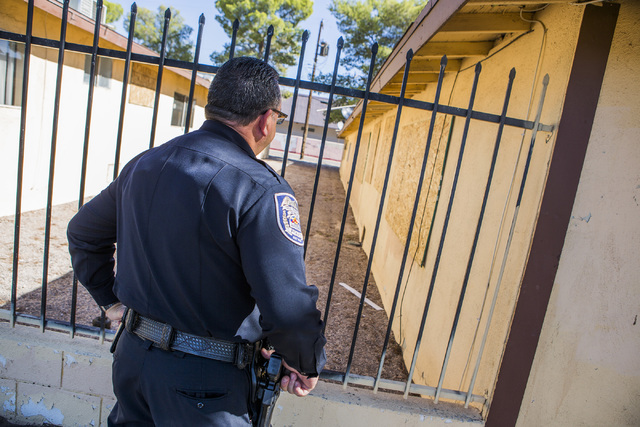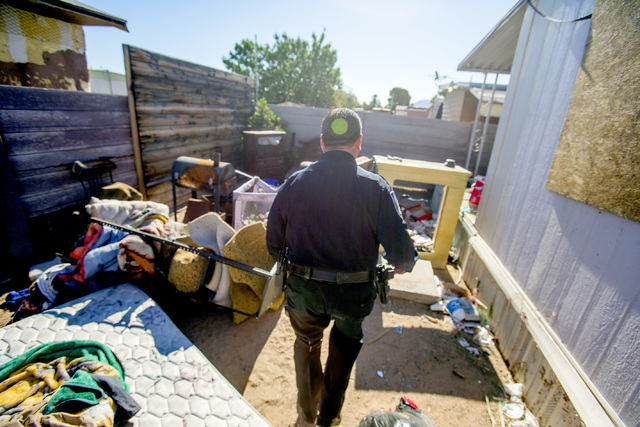Special police units work to combat squatters in Las Vegas Valley
The Great Recession hit Las Vegas like a storm, leaving in its wake a surplus of empty houses and financial troubles.
With homes around the valley in various stages of the foreclosure process, it can be hard to track ownership paper trails, making them an easy target for squatters.
“Squatters are really opportunistic,” said Sgt. Kirk Moore of the Henderson Police Department. “They look for easy targets all throughout the valley. This problem has been a combination of things. It initially started when the housing market took a hit and the criminals saw all of the homes that were available and they took advantage of it.”
Scott Beaudry, president of the Greater Las Vegas Association of Realtors, has first-hand experience with squatters. He recently received a call about squatters at a fourplex. When he went to investigate, a woman approached him, showed him her lease and said she was living there.
“It turned out she was a habitual squatter and the community just couldn’t get rid of her,” Beaudry said. “She started to get very confrontational with the community manager, calling her all sorts of names. I called the police, and a few days later they told me she was gone. When I went to check out the property, I found that someone had detached the incoming line to the water feeder located on the balcony. The balcony was just flooded. She was trying to destroy the property.”
Not only that, but Beaudry added that she had four other squatters paying her $700 a month for rent.
“It turned out she was also a scam artist,” Beaudry said. “She was quite the entrepreneur, but this was totally illegal.”
Metro reports 32 percent increase in squatting calls since 2013
Beaudry said that 20 percent of the valley’s currently available properties are in distress — either they are a short sale or banked-owned — and many are vacant.
As of June 30, the Metropolitan Police Departmenttracked 2,725 squatter-related calls this year, marking a 32 percent increase in reported squatters compared to 2013.
From October 2015 through July 18, Metro made 23 arrests for unlawful occupancy and six arrests for housebreaking, which requires proof that an individual broke into the home. Although both are considered gross misdemeanors, being convicted a second time for housebreaking is a felony.
Another possible charge for squatting is trespassing.
The only place that has seen a reduction in squatter-related calls is the northwest valley, down by 10 percent, according to Metro Lt. Nick Farese, whose team of 30 detectives investigates squatting, among several other crimes.
Squatters often bring with them criminal activities, officers say
Police officers say squatters are infamous for leaving a trail of destruction in their wake, including broken windows, filth and feces. Many free-living occupants also set up illegal businesses, such as prostitution rings, narcotics labs and chop shops.
Once they move into an area, squatters can easily turn on the electricity in a home, but accessing water is more difficult because it requires proof of legal ownership or a rental agreement.
Part of the problem used to be that squatters were presenting fake leases, making it difficult for police officers to remove them. Most squatters will look at the Clark County Assessor’s website, find out who the homeowner is and create a fake lease with a fake signature.
In some instances, police officers conclude the matter to be a civil dispute rather than a trespassing crime — the difference being that civil disputes become a landlord-tenant problem, instead of trespassing, which police can charge as a misdemeanor. Once AB 386 — which makes it a criminal offense for squatters to re-enter a home they were removed from — took effect Oct. 1, it became easier to combat.
Other cons are easier to spot: Sometimes leases are signed in colored pencils, markers or crayons.
“Other times, people answer the door with a lease in their hand,” said Matthew Meanea, code enforcement officer for the city of North Las Vegas. “Who does that?”
Another challenge for police departments is the “Cash for Keys” program. If foreclosure is imminent, and someone is considering a deed in lieu of foreclosure — a transaction where the homeowner voluntarily transfers title to the property to the lender in exchange for a release from the mortgage obligation — some lenders are willing to pay someone to vacate a home in a timely fashion. The money exchanged, which can vary from $750 to $30,000, is intended to pay for relocation costs.
Squatters who have caught on to this program have been moving from place to place, collecting money from banks.
North Las Vegas, Henderson police also have dedicated squatter teams
The North Las Vegas Police Department has cracked down on the squatter situation. As of July 14, the department has received 180 squatter-related calls this year and addressed about 100.
North Las Vegas Police Officer Scott Vaughn, who leads the department’s squatter enforcement unit, said many squatters prefer Fannie Mae properties because they require vacating homeowners to leave the water and electricity on.
Squatters are also becoming savvier, he said.
“Periodically, we come across a situation where it’s obvious that someone had inside information because of what homes they were targeting,” Vaughn said. “They also had the mechanical lock box open without breaking them. A Realtor had to do that.”
The Henderson Police Department also has a team dedicated to squatting called the Problem Solving Unit. Moore said they have received 93 service calls and made eight arrests since AB 386 passed and the department began tracking Henderson’s squatter situation.
“A majority of the squatting that I’ve seen has a criminal element to it,” Moore said.
Farese agreed.
“I hate to make this sound like an after-school special, but squatting is like a gateway crime,” he said. “When we go into houses, we find illegal narcotics, chop shops, stolen property and fraud (or forgery) labs. They’re not trying to blend into the neighborhood. It doesn’t take long for them to wreak havoc on a community.”
To report squatting call 311, or if it’s an emergency, 911.
North Las Vegas residents can also call code enforcement at 702-633-1677, or download the “Contact North Las Vegas” mobile app.
Henderson residents can visit cityofhenderson.com and click on the police page to submit a report online, or visit police headquarters at 223 Lead St.
Editor’s note: This is part one of a three-part series on squatting in the Las Vegas Valley. If you’ve had an experience with squatting in your neighborhood, contact View reporter Sandy Lopez.
To reach North View reporter Sandy Lopez, email slopez@viewnews.com or call 702-383-4686. Find her on Twitter: @JournalismSandy.



